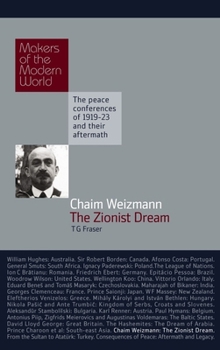Chaim Weizmann: The Zionist Dream
(Part of the Makers of the Modern World Series)
The Arab-Israeli conflict has been one of the most defining features of recent world history, flaring up into open war fare yet again in Gaza at the end of 2008 and provoking large-scale demonstrations in the streets of cities across the world. The decision in 1919 by the Paris Peace Conference to award the Mandate for Palestine to Great Britain--which had announced its commitment to the creation of a national home for the Jewish people in the Balfour Declaration two years previously--sowed the seeds of this seemingly intractable problem, yet when the Zionist leader Chaim Weizmann (1874-1952) spoke before the Conference on 27 February 1919, he would have appeared as only one of the many representatives of minor nationalities putting their case to the peacemakers, and, what is more, one whose people had no territory of their own. How a Jewish chemistry professor from an obscure part of Eastern Europe could find himself at the heart of international diplomacy, and later become the first president of the State of Israel, is one of the most fascinating stories of the Paris Peace Conference and its aftermath. Ninety years after the Conference, what Weizmann said and did there is an essential part of our understanding of how this small, but critical, part of the world evolved out of the deliberations.
Format:Hardcover
Language:English
ISBN:1905791674
ISBN13:9781905791675
Release Date:September 2010
Publisher:Haus Pub.
Length:216 Pages
Weight:0.90 lbs.
Dimensions:0.8" x 5.1" x 7.9"
Customer Reviews
0 rating





